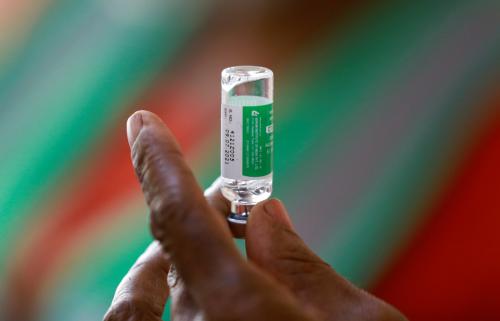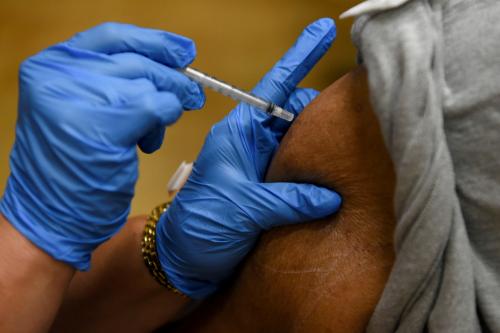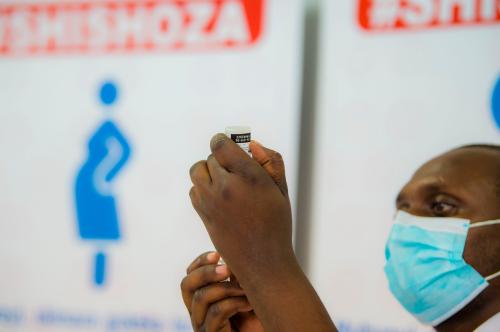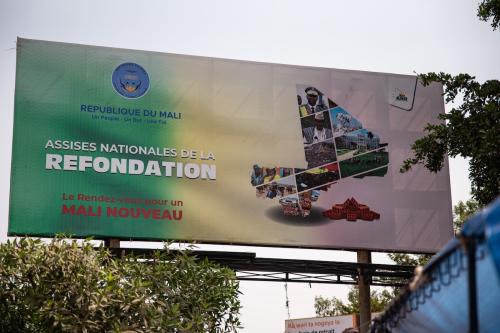Vaccinations are essential to responding to epidemics, and the current COVID-19 pandemic is no exception. Yet, globally, many choose not to get vaccinated for reasons that have, only recently, gained attention among researchers, policymakers, and the wider public. Among the reasons cited is a general distrust in the government and health institutions in charge of vaccination. But where does this distrust come from? Some recent evidence links the distrust to negative past experiences with government institutions because of discrimination in the health care system and unethical medical trials, among other explanations.
In 1996, Nigeria experienced one of the worst meningitis epidemics in its history with 109,580 cases and 11,717 deaths. Bacterial meningitis is an infection of the lining of the brain that is especially virulent in children. Northern Nigeria is also a majority-Muslim region, with around 99 percent of residents in Kano state identifying as Muslim. At a hospital in Kano, Doctors Without Borders treated children with chloramphenicol, a well-known antibiotic endorsed by the World Health Organization (WHO) to treat bacterial meningitis.
Over the same period, Pfizer, a U.S. pharmaceutical company, tried to launch a new antibiotic drug, Trovan. While Pfizer had tested the drug on adults, it had not yet been tested on children. Additionally, early testing on adults had shown some serious side effects of the drug, including liver problems and cartilage abnormalities. After learning of the meningitis epidemic, Pfizer decided to use it as an opportunity to test the efficacy of Trovan in pediatric settings. Pfizer set up a site beside the Doctors Without Borders testing area and over two weeks, selected a sample of 200 children between 3 months and 18 years old to participate. A month later, 11 of the children that had participated were dead. Additionally, numerous parents of children involved in the trials reported disabilities among their children, including paralysis and liver failure.
In December 2000, The Washington Post published a series of exposés, alleging Pfizer’s fault in the deaths and disabilities of multiple children and accusing Pfizer of conducting unethical experimental trials without attaining informed consent from the participants. Parents alleged that they had not been informed of the experimental nature of the trials, with many reporting that they thought they were receiving the standard medication issued in the neighboring Doctors Without Borders area.
The reporting sparked a series of protests in Muslim states in northern Nigeria in 2001. Protesters, led by Muslim religious leaders, highlighted the deaths of Muslim children and the fact that the trials had been conducted in a Muslim state as evidence for the claim that Pfizer and its associated “Western” institutions were targeting and trying to kill Muslims with vaccines. Pfizer denied any wrongdoing, stating that the children died of meningitis rather than their drug. An investigation by a panel of experts hired by the Nigerian government found Pfizer at fault in the children’s deaths and guilty of conducting human trials without informed consent. In subsequent years, several lawsuits were filed against Pfizer by parents and the Kano state government. An out-of-court settlement was reached for, allegedly, $75 million to Kano state and $175,000 to four families of dead children in 2009.
The incident heightened distrust among Muslims toward vaccination campaigns led by Western nonprofits like the Global Polio Eradication Initiative (GPEI), a consortium including the WHO and the U.S. Centers for Disease Control and Prevention (CDC), aimed at eradicating polio worldwide (with a particular focus on Nigeria where more than 40 percent of the 677 new polio cases worldwide were recorded in 2002). Tensions culminated in a 2003 Muslim leader-led boycott of GPEI-led polio mass vaccination campaigns in five Muslim northern states in Nigeria. In interviews explaining support for the boycott, respondents explicitly cited the Pfizer drug trials. The boycotts continued for over a year and ended only after federal government officials worked with local religious leaders to demonstrate the safety of the vaccine. The boycott also led to a 30 percent increase in polio prevalence, setting back global polio eradication efforts by over a decade, with Nigeria becoming one of the last countries in the world to be declared polio-free in 2000. The Pfizer trials remain a point of tension among Muslims in Nigeria, with the specter of Muslim children’s deaths often referenced any time health authorities attempt to conduct mass vaccination campaigns in the country.
Effects of the trials on vaccine hesitancy and the role of education and trust
In a new working paper, we find that Muslim mothers significantly reduced their vaccinations of children born after 2000. The reduction (a magnitude of 11 percent to 27 percent relative to the pre-Washington Post news vaccination rate) included routine childhood vaccines for diseases such as tuberculosis, diphtheria, pertussis, and tetanus, polio, and measles—vaccines that have been known to be safe and effective for decades.
The reductions were concentrated among educated Muslim mothers who had access to more information, were literate, and hence were more likely to have read the news and be informed of health practices. The reduction effect was also stronger for Muslim mothers residing in Muslim-minority neighborhoods, where Muslims made up less than 50 percent of the neighborhood’s demographic. This pattern aligns with research showing that religious individuals may cleave more strongly to religious networks in areas where they are the minority. We find that Muslims residing in minority-Muslim neighborhoods tend to be more religious (i.e., attend mosque more frequently) and more trusting of their religious leaders, supporting the explanation that they would have been more exposed to and more receptive of their religious leaders’ anti-vaccine campaigns.
While Pfizer settled out of court for $75 million, how do these costs compare to the costs of reduced child vaccination in the country? Being unvaccinated increases an individual’s risk of infection from disease. The significant costs to treat these illnesses can incur large financial burdens on households. We conduct simple back-of-the-envelope calculations on the potential costs of treatment from an increased number of unvaccinated Muslim children as a result of the negative news about the Pfizer drug trials. Using our most conservative estimates of direct medical costs of treatment only, and without factoring in any potential deaths from disease, the reduced vaccination of Muslim children in the aftermath of the disclosure of the Pfizer drug trials incurred a total potential cost of treatment of over $94 million over the counterfactual scenario. This cost is more than $19 million higher than the Pfizer settlement to the Nigerian government of $75 million.
Researchers are increasingly recognizing the importance of public trust for the effectiveness of vaccination campaigns aimed at reducing the spread of disease during epidemics. The results from our paper show that negative news about vaccination can significantly increase vaccine hesitancy and local trust networks can be key drivers of vaccine hesitancy, especially among minority populations within regions with potentially stronger own-group cleavage. So, policymakers aiming to increase vaccination in the aftermath of epidemics must work to build and leverage trust within these local networks to enhance vaccine uptake. The findings also highlight the importance of careful, ethical, and transparent practices in vaccination efforts and institutional and local community network trust in vaccine compliance.
The Brookings Institution is committed to quality, independence, and impact.
We are supported by a diverse array of funders. In line with our values and policies, each Brookings publication represents the sole views of its author(s).







Commentary
What do Pfizer’s 1996 drug trials in Nigeria teach us about vaccine hesitancy?
December 3, 2021